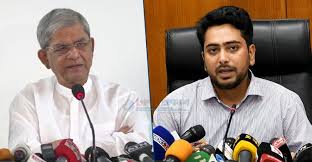
The demand for a neutral government by BNP Secretary General Mirza Fakhrul Islam Alamgir is a clear indication of plans to form another 1/11 government, according to Post, Telecommunication, and Information Technology Adviser Md Nahid Islam. He made the statement in a detailed post on his verified Facebook page on Thursday, January 23.Nahid Islam argued that Fakhrul's call for a neutral government is essentially a veiled attempt to recreate the 1/11 government. He pointed out that the Awami fascism that emerged post-1/11 is the foundation of the current political climate. The BNP leader’s remarks signal the possibility of a future 1/11-style government with a parliamentary majority, foreign policy flip-flops, and no justice for disappearances, murders, or the July massacres.Islam further elaborated on the historical context, stating, “Since August 5, plans to eliminate student leadership and execute a coup have been underway. While students and the masses fought on the streets, and police continued to fire, many compromise-seeking national leaders were scheming to form a government in the cantonment, excluding the people—students were even mentioned as irrelevant at that time.”
He continued, “We’ve consistently rejected martial law and emergency rule since August 3, despite repeated invitations to join the cantonment talks. Ultimately, after discussions at Bangabhaban, the idea of an interim government under Dr Yunus was decided.”
Islam emphasized the need for a national government led by anti-fascist political parties and civil society, arguing, “Had a national government been formed, the students might not have needed to take to the streets. But the BNP opposed such a government, and now, after the coup, it speaks of forming a ‘neutral government’ after the elections.”
Highlighting the distinctions between the current government and the 1/11 regime, he added, "The students are the defining force today. While the BNP had earlier discussed a 'minus-two' scenario, it now proposes another 1/11-like government under the guise of neutrality, aiming to secure a path to power."
He strongly criticized such a plan, claiming it would undermine democracy and national interests. "The people, including students, will never accept this. It seems like a conspiracy even against the BNP," he said.
Referring to the political dynamics within the government, Islam pointed out that despite the claims of neutrality, individuals with ties to the BNP, like the Attorney General and the former IG of Police, were appointed in key positions as early as August 6. “This reality must be considered when discussing election neutrality,” he warned.
Islam also questioned the unity of the country, lamenting, “While India’s main parties have united against the Awami League, we in Bangladesh have failed to do the same despite numerous killings and crimes. Is this the ‘national unity’ we seek? It’s easier to divide Bangladesh than unite it, and some of its leaders are ready to sell out cheaply.”
He concluded with a call to the BNP’s patriotic leaders, urging them to choose solidarity with the student masses instead of opposing their uprising. “I believe not all of the BNP shares this stance. A large section of its workers and supporters aspire to see the downfall of this government. I call on the BNP’s selfless leadership to embrace greater unity, standing with the students in their fight for a better Bangladesh.”

